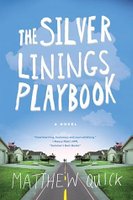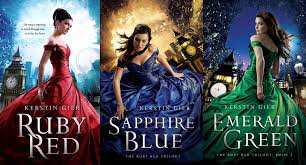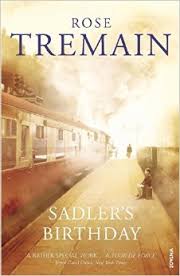It’s hard to believe that we are on the brink of the third month of the year already. And all things considered, it’s not been a bad birthday month of books for yours truly. From America to Germany to England, the end of February sees me in Edwardian London courtesy The Vesuvius Club, the self-deprecatingly subtitled “a bit of fluff” first book (part of a trilogy) concerning the misadventures of one Lucifer Box (leading portrait painter and undercover agent for His Majesty’s government). In the few chapters I’ve read so far, Mark Gatiss has managed fluff of a very high (and addictive) quality and I’m looking forward to the rest of this comedic satire of the spy/thriller/detective genre.
When Stephen Fry calls it – “The most delicious, depraved, inventive, macabre and hilarious literary debut I can think of.” – what else do you need?

I started off February with The Silver Linings Playbook. The book had been lying on my shelf for a good two years. Usually I’m the one who reads a book before watching the screen adaptation, but there are exceptions (like with The Perks of Being A Wallflower, for instance, which when I come to think of it has a fair amount of parallels with this one, except this is for adults) when the situations are reversed. In such a case, I prefer to leave off reading the book until I’ve sufficiently distanced myself from the cinematic version, especially if it’s a film I’ve particularly enjoyed. And yet, there remained some preconceived notions in my mind. But I needn’t have worried too much. The book, despite fundamental differences making it an almost independent narrative, is very enjoyable, though far from the light-hearted story one might expect based on the script.
The writing style (Pat Peoples’ first person point of view) was fluid, easy to get into, and the repetitions as well as the high-strung, focused mindset of Pat served well as a way to viscerally experience everything from his vantage point. With his mental health issues and the limited information given to him (and as a result us too) in order to recover from the same, he is an unreliable narrator, and there are things that start to become clear to the reader only a bit further on into the narrative once cracks start to slowly appear in his version and knowledge. It doesn’t take anything away from the almost childlike quality to Pat’s narrative voice, behaviour and observations (some of them are rather funny in a dry, dark sort of way). In fact, it only heightens the sense of his situation as a guy who is still processing past trauma and trying to get a grip on reality, even as he fights against and controls his inherent, rather destructive impulses. All the supporting characters are fairly well fleshed out, engaging and clearly care about Pat’s well-being in their own way—even Tiffany, the sister of Pat’s best friend’s wife who is dealing with psychological issues of her own. Again I have to point out that if you keep comparing the film and book, you are going to end up not enjoying either. And that would be a shame.
The second of February’s offerings came from my German friend, Fabian, who was awesome enough to send me books in the post. It was a YA trilogy by German fantasy author, Kerstin Gier. Fantasy, time-travel, magic, prophecies, love and London— what’s not to like? Turns out that there were things in the execution and larger scheme that were not to my liking, but more about that later. (On a side-note, how gorgeous are the covers?)

16 year old Gwyneth Shepherd or Gwen is a seemingly ordinary schoolgirl. She lives in London with an eclectic group of family members, one of whom is her perfect cousin Charlotte. Sounds normal enough? Well, only until you find out that Gwen has always been able to talk to ghosts and there is a time-travelling gene that runs in her family DNA. Charlotte, who is predestined to have it (or so they believe), has trained for her whole life to prepare for the moment when the gene first activates. Only, as it turns out, everyone was wrong and it’s a completely unprepared Gwen who finds herself thrown back into the 18th century while on her way to buy lemon sherbets. She is introduced to the secret society of the Guardians and meets arrogant, handsome (well, her favourite adjective for him is “hot”) Gideon, another time-traveller, who will be her partner as try to unearth the mysteries and prophecies surrounding the Circle of Twelve (12 time-travellers through the ages—Gideon is the “Diamond” and Gwen, the last missing one, the “Ruby”), the chronograph (the machine that controls when and where they travel in time) and the Circle’s founder, the dark Count Saint-Germain. Along the way, she discovers secrets about her own past and family and of course also has a very “teen relationship” situation with Gideon.
Gwen is a fairly likeable protagonist on the whole (though I did not appreciate how much she cried and whined in book three), and quite funny and sarcastic too. She comes across as a bit vapid in the beginning, but does grow into her own (I wonder how much is a translation issue since the dialogue appeared more suitable for tweens and not 16 year olds). The attraction between her and Gideon is a bit too sudden for my liking, but the tumultous nature of their love is very realistic when you consider their ages. I enjoyed the thrill, the adventures, the gorgeously detailed costumes and unravelling the secrets. Some of my favourite characters were the secondary ones—Gwen’s best friend, Lesley, her gargoyle side-kick, Xemerius, her great-aunt Maddy among others—and I wish there was more time to get to know these characters, who do still manage to be more fleshed-out than some of the main players (Gideon, the count, Dr. White, Grandpa Lucas).
Which brings me to my main peeve about this trilogy. Bear in mind that I read all 3 books in 2 days, but it did feel rushed and if I hadn’t read all the books back-to-back, I’d have felt like I had read one story in three parts. Whether part of a series or not, each book was unable to stand alone. The first is largely to set up the world and backstory, which is complicated enough without withholding information from us like the Guardians do (Gwen is kept in the dark about many things since she is a newcomer and cannot be trusted), while the second, though more independent, just seems to set up the final book. A lot of the reveals fell flat for me since I had guessed them or at least had my suspicions about them long before they happened. And of course the fact that all of the present-day action takes place over a very short period of time and time travel in general is a complicated realm to begin with. I won’t go into the confusion with regards that, but there are situations with paradoxes and rule-breaking of the tenets of time travel as described in this world, including one major loophole which ruined a large part of the main story-arc for me.
To be fair to the books, there wasn’t a lack of details thrown at us, but the three-dimensional believability of the world, the characters, its rules, its history fell short for me The end felt pretty anti-climactic as well after all the sense of urgency throughout the trilogy, and I was left with a sense of incompleteness and frustration. I don’t regret reading these since I enjoyed them on the whole, but ultimately it just felt like the books took on a lot more than they could handle and ended up being far more underwhelming than they had the potential of being. There are movie versions in German (with English subtitles) and I’m looking forward to checking them out when I can.
From modern-day London, it is a very short hop to the English countryside (in and around the Second World War and later). I had not read anything by Rose Tremain, though several of her books have been on my to-read list for a while now. Sadler’s Birthday, her debut novel, is not the kind of book I would have searched for on Amazon. Actually, the blurb is very vague (Today is Jack Sadler’s birthday. Or is it? He’s not sure, he doesn’t really care. It might be his last day or the beginning of a new chapter in his life. He must find the key to his old room. He knows the truth about his past lies there and somehow he must get in and confront it.) and doesn’t give anything away, and so I can’t really explain what made me pick it up at a used books sale a few years ago.

Jack Sadler is an aged butler who is living in the very mansion he worked in for much of his life. His employers, childless, have passed away long ago and only an old dog keeps him company. Used to routine and a bit of a recluse, Sadler isn’t the most immediately endearing of characters. This is a slow, meandering book written in a tight, sparse style that somehow ensures the both don’t clash. The entire book takes place over a weekend and Tremain utilises a lot of flashbacks (in random chronological order) to take us through all the points of note in Sadler’s life. Sadness (and also a bit of bitterness) seeps through every part of this narrative; a feeling of life passing us by and leaving us with only our past regrets and painful memories. There is also a very disturbing revelation midway through the book (though I had an inkling earlier on) that is surprising for the matter-of-fact manner in which both the writer and Sadler seem to treat it with. This isn’t a book I particularly enjoyed, but I could appreciate what made Tremain such a powerful writer even back then, and I’m looking forward to reading some of her more recent work (Very reminiscent of The Remains of the Day which I enjoyed more, though this predates Ishiguro’s effort by some years).
Rounding off February are the two Rick Riordan stories from his Percy Jackson and Kane Chronicles crossover. Part of the “Demigods and Magicians” trilogy, these stories take place in and around New York (where both the Greeks and Egyptians have their respective headquarters) and feature Percy, Annabeth, Carter and Sadie—and of course the prospect of a super-villain rising to take control over the world.
I had read the first story, The Son of Sobek (featuring Percy and Carter) a few years ago, but hadn’t gotten around to the others. The Staff of Serapis (with Annabeth and Sadie) is the second, while The Crown of Ptolemy has the four combining forces against an old nemesis from the Kane Chronicles. All of course with some wise-cracking, fast-paced action that combines the skills of our Greek demigods with the power of the Egyptian magicians (as usual there are some great messages in there about heroism, the power of team-work, good and evil). It’s great to meet old friends, though you want the stories to last a lot longer, and the new interesting element is how the two mythologies intersect with each other. I’m already counting down the days for the next book from Rick Riordan’s pen.
(I also referred to Colm Toibin’s Homage to Barcelona this month as research for a piece I was working on. I want to read it cover-to-cover at some point, having thoroughly enjoyed the parts that I did go through.)